Twisted terrorist parents turn their children into weapons of slaughter
They were the perfect terrorists’ disguise — three little girls aged eight, nine and 12, co-opted by their militant parents.
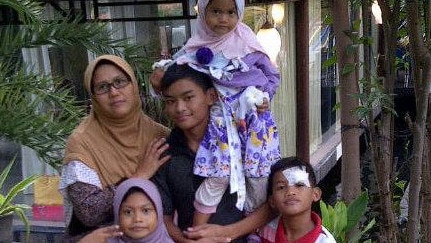
They were the perfect terrorists’ disguise — three little girls aged eight, nine and 12, co-opted by their militant parents in a wave of suicide bombings over two days of deadly carnage in Indonesia’s second-largest city of Surabaya.
Less than a day after Indonesian police revealed Sunday morning’s near-simultaneous suicide bombings on three churches across Surabaya were the work of one family of six, they said a second bombing at Surabaya’s police headquarters yesterday morning was carried out by a family of five, including an eight-year-old girl.
The horrific attacks mark the first time in Indonesia that children have been used as suicide bombers, a tactic common in Syria but one Indonesia’s President Joko Widodo labelled “barbaric” and the country’s police chief, Tito Karnavian, described as “worrying”.
The eight-year-old girl survived yesterday’s blast but suffered severe injuries in the attack which killed her two brothers, her mother and father.
A further 10 people, including civilians and police officers, were wounded in the explosion.
CCTV images showed chaotic scenes, with the mangled wreckage of two motorbikes at the security gate of the central police headquarters.
In all, 25 people have died in attacks across Surabaya, beginning on Sunday morning with a series of suicide bomb blasts outside three churches, all of which involved the use of triacetone triperoxyde, the highly explosive substance favoured by ISIS, which has claimed credit for the church attacks.
The first bomb, at 7.10am on Sunday, was detonated by two brothers, aged 17 and 15, on a motorbike outside the Santa Maria Catholic Church.
That blast killed the two youths and at least four more — including two other young brothers, Nathaniel and Vincenius, aged eight and 11.
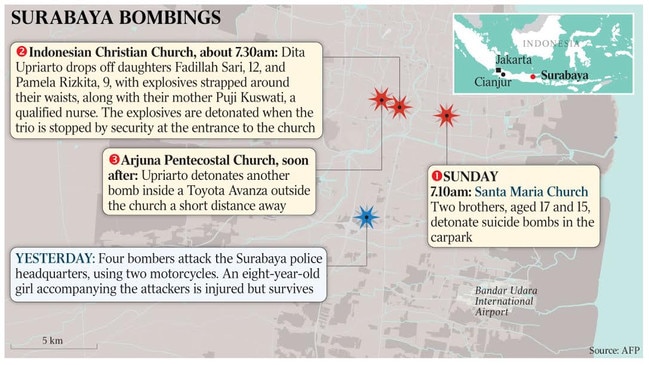
Just 20 minutes later the bombers’ two sisters, Pamela Rizkit, 9, and 12-year-old Fadillah Sari, two little girls wearing hijabs and small explosives belts fitted earlier by their father, were led to their deaths by their mother at the door of the Indonesian Christian Church as the congregation gathered for the morning sermon.
The children’s father, Dita Upriarto, then drove a car filled with explosives to the Arjuna Pentecostal Church where he detonated the bomb, sending thick smoke and flames pouring from the building.
All six family members were killed in the church attacks.
Three other people, a bomb maker, his wife and their child, were killed and two wounded when a bomb exploded at an apartment just outside Surabaya on Sunday night, police said. The couple’s three other children survived and would be “crucial witnesses”, authorities said.
Mr Joko expressed anger and revulsion at the attacks yesterday and vowed to use the powers of his office to push through strict new terror laws that have been held up in parliament for two years.
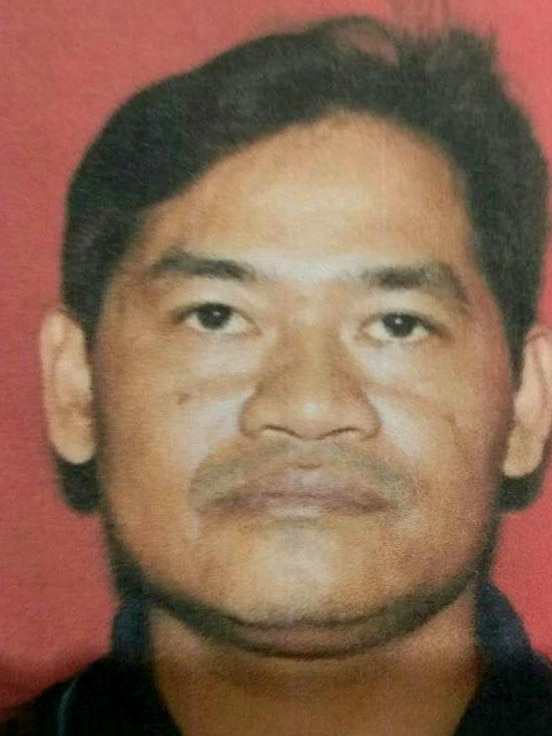
“This is the act of cowards,” he said. “There will be no compromise in taking action on the ground to stop terrorism.”
Neighbours of the middle-class family of six who launched Sunday’s church strikes described a “friendly, happy” family who displayed no outward signs of radicalism, or even particular religiosity.
“I knew Pak Dita. He was not like the terrorists that we see on television, with long beards, turbans,” neighbour Anang Surahman, 42, told The Australian.
“His wife (Puji Kuswati, 42) was also quite normal. She liked to wear a long hijab, but colourful, not all black. The same with their daughters. Every morning and afternoon they would play in the complex, riding bicycles.
“Sometimes the children played with my cat. They played with my daughter every day and struck me as happy children.
“I just can’t wrap my head around the idea of Pak Dita and his children carrying out attacks like that.”
Facebook pictures certainly show an outwardly normal family, including holiday snaps of white-water rafting in North Sumatra.
Another neighbour, accounting student Kazmi Tay Ghani, 23, also insisted the family had not left the compound for more than a few days at a time in the six years he had lived there.
The couple regularly socialised with their neighbours and were “famous for being nice”, he said.
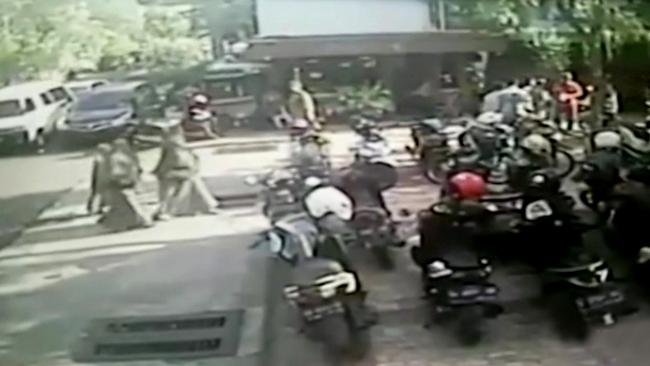
But the Indonesian police chief, General Tito, said the family was connected to Indonesia’s Jamaah Ansharut Daulah, an umbrella organisation of local ISIS-affiliated extremist groups proscribed by the US State Department.
He said police now believed all attackers were part of the same JAD Surabaya cell, led by Dita Upriarto, and the group was responding to recent ISIS instructions to launch attacks worldwide.
General Tito had initially said the family had moved to Syria to join the ISIS caliphate - like hundreds of Indonesians who have attempted to do so in recent years caliphate -but had crossed back over the border and eventually been deported back to Indonesia by Turkish authorities.
The family had then settled in Surabaya where Mr Dita ran an online business selling fragrant oils - apparently a cover for his role as head of the JAD cell in Surabaya.
He later conceded those reports were incorrect after long time neighbours said the family had not left the suburb for more than a few days at a time.
General Tito did confirm however that all three families involved in the blasts - outside the churches, in the apartment, and outside police HQ were friends.
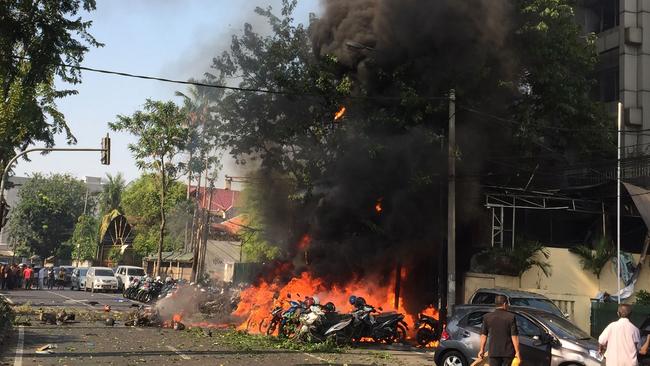
JAD, led by jailed radical Aman Abdurrahman, has been linked to several deadly incidents, including a 2016 gun and suicide attack in the capital Jakarta that left four attackers and four civilians dead.
The Surabaya attacks follow a 36-hour stand-off in a high security jail outside Jakarta by terrorist prisoners who tortured and killed five officers of the country’s crack counter-terrorism police unit, Detachment 88.
Police on Sunday said four suspected JAD members were killed in a shootout during raids linked to a deadly prison riot this week.


